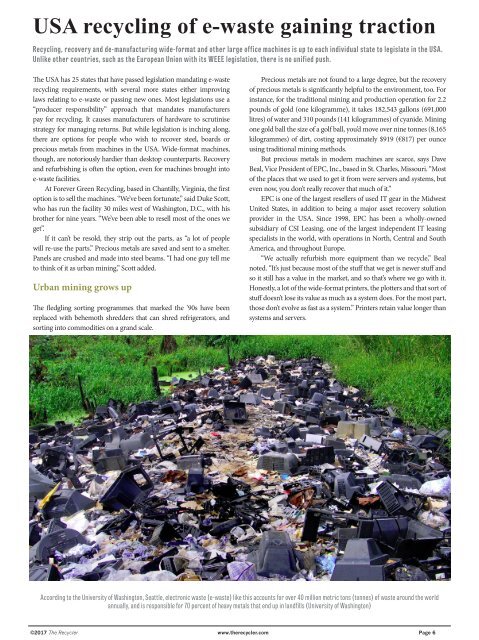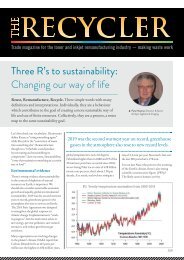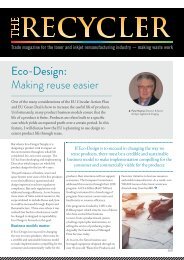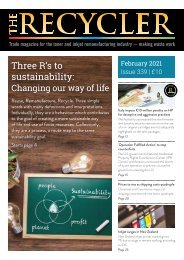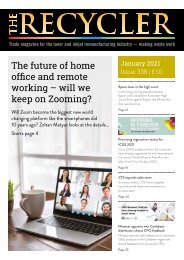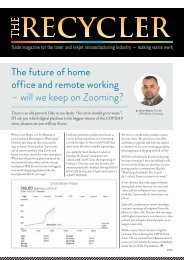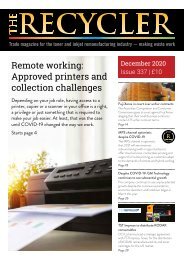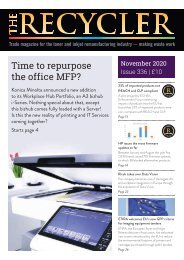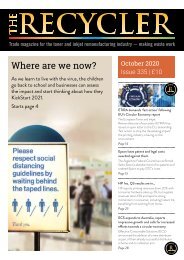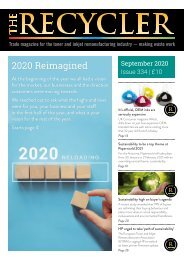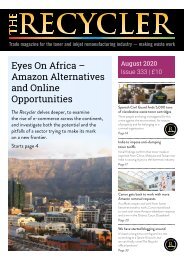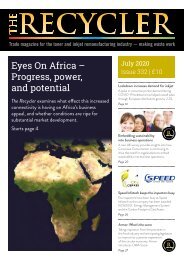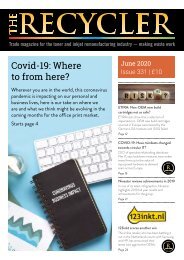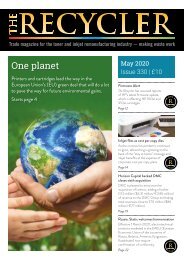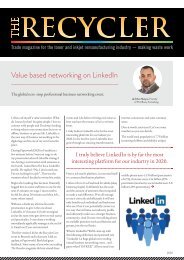Wide Format news 1-2017
Create successful ePaper yourself
Turn your PDF publications into a flip-book with our unique Google optimized e-Paper software.
USA recycling of e-waste gaining traction<br />
Recycling, recovery and de-manufacturing wide-format and other large office machines is up to each individual state to legislate in the USA.<br />
Unlike other countries, such as the European Union with its WEEE legislation, there is no unified push.<br />
The USA has 25 states that have passed legislation mandating e-waste<br />
recycling requirements, with several more states either improving<br />
laws relating to e-waste or passing new ones. Most legislations use a<br />
“producer responsibility” approach that mandates manufacturers<br />
pay for recycling. It causes manufacturers of hardware to scrutinise<br />
strategy for managing returns. But while legislation is inching along,<br />
there are options for people who wish to recover steel, boards or<br />
precious metals from machines in the USA. <strong>Wide</strong>-format machines,<br />
though, are notoriously hardier than desktop counterparts. Recovery<br />
and refurbishing is often the option, even for machines brought into<br />
e-waste facilities.<br />
At Forever Green Recycling, based in Chantilly, Virginia, the first<br />
option is to sell the machines. “We’ve been fortunate,” said Duke Scott,<br />
who has run the facility 30 miles west of Washington, D.C., with his<br />
brother for nine years. “We’ve been able to resell most of the ones we<br />
get”.<br />
If it can’t be resold, they strip out the parts, as “a lot of people<br />
will re-use the parts.” Precious metals are saved and sent to a smelter.<br />
Panels are crushed and made into steel beams. “I had one guy tell me<br />
to think of it as urban mining,” Scott added.<br />
Urban mining grows up<br />
The fledgling sorting programmes that marked the ’90s have been<br />
replaced with behemoth shredders that can shred refrigerators, and<br />
sorting into commodities on a grand scale.<br />
Precious metals are not found to a large degree, but the recovery<br />
of precious metals is significantly helpful to the environment, too. For<br />
instance, for the traditional mining and production operation for 2.2<br />
pounds of gold (one kilogramme), it takes 182,543 gallons (691,000<br />
litres) of water and 310 pounds (141 kilogrammes) of cyanide. Mining<br />
one gold ball the size of a golf ball, you’d move over nine tonnes (8,165<br />
kilogrammes) of dirt, costing approximately $919 (€817) per ounce<br />
using traditional mining methods.<br />
But precious metals in modern machines are scarce, says Dave<br />
Beal, Vice President of EPC, Inc., based in St. Charles, Missouri. “Most<br />
of the places that we used to get it from were servers and systems, but<br />
even now, you don’t really recover that much of it.”<br />
EPC is one of the largest resellers of used IT gear in the Midwest<br />
United States, in addition to being a major asset recovery solution<br />
provider in the USA. Since 1998, EPC has been a wholly-owned<br />
subsidiary of CSI Leasing, one of the largest independent IT leasing<br />
specialists in the world, with operations in North, Central and South<br />
America, and throughout Europe.<br />
“We actually refurbish more equipment than we recycle,” Beal<br />
noted. “It’s just because most of the stuff that we get is newer stuff and<br />
so it still has a value in the market, and so that’s where we go with it.<br />
Honestly, a lot of the wide-format printers, the plotters and that sort of<br />
stuff doesn’t lose its value as much as a system does. For the most part,<br />
those don’t evolve as fast as a system.” Printers retain value longer than<br />
systems and servers.<br />
According to the University of Washington, Seattle, electronic waste (e-waste) like this accounts for over 40 million metric tons (tonnes) of waste around the world<br />
annually, and is responsible for 70 percent of heavy metals that end up in landfills (University of Washington)<br />
©<strong>2017</strong> The Recycler www.therecycler.com Page 6


